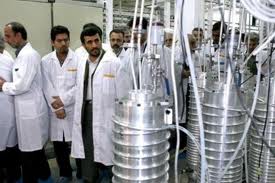 Russia does not consider sanctions to be an effective way to address the Iranian nuclear issue, Dmitry Peskov has said in an interview with the National Interest. Diplomacy is preferable, was the officials position.
Russia does not consider sanctions to be an effective way to address the Iranian nuclear issue, Dmitry Peskov has said in an interview with the National Interest. Diplomacy is preferable, was the officials position.We have witnessed numerous times when sanctions did not create any obstacles for very grave situations, but they were significantly harming the civilian population, the people of the country, and making their living unbearable. So sanctions are not every time a good way or the best way, Press secretary for Russias President Vladimir Putin said.
We have to be wise enough to use the capacity of diplomacy 100 percent. We are hoping for reciprocal understanding from our Iranian partners, he emphasized.
In 2012 EU countries levied an embargo on Iranian oil exports in order to put additional pressure on Iran and encourage them to negotiate their nuclear ambitions. A similar package of sanctions was later adopted by the United States. The United States, some Western countries and Israel believe Iran is developing a nuclear weapon, Iran keeps denying the allegations and insists that its nuclear program is peaceful.
We do not want to jeopardize the non-proliferation regime, but at the same time we will accept the rights of the Iranians for peaceful nuclear energy, Dmitry Peskov, press secretary for Russias President Vladimir Putin, has said while answering a question about Russias readiness to join in the international campaign aimed at encouraging Iran to give up its nuclear weapons program.
We are standing on the same ground as our American partners in terms of Iran, so actually strategically we share the same values Peskov said in an interview with the National Interest magazine. The interview script was made public on the medias web-site yesterday.
A wide range of diplomatic means are being used now, according to Peskov, in order to ensure that the non-proliferation regime is kept properly and to assure the international community that all relevant proofs are taken and that there shouldnt be any concern.
We have to continue our dialogue with the Iranian side, he concluded, while mentioning that there is still room for diplomatic activity.
We would like to have our relationship with the United States be as advanced as possible, Dmitry Peskov, press secretary for Russias President Vladimir Putin, has stressed in an interview with a US magazine, and added that Russia is expecting a reciprocal attitude from Obamas administration.
We would like to ensure that the relationship is a genuine relationship of strategic importance, of global importance. We attach very great importance to this relationship, Peskov said during an interview with the National Interest, published on the magazines site yesterday.
Unfortunately the flow of our bilateral relationship, the flow of some steps from Washington, it shows a kind of an attitude that unfortunately cannot be treated in Moscow as a reset mood, he emphasized.
At the same time the Russian official noted that the resent cannot be endless, and that the word reset should be retired because the relationship has moved in a new direction.
Russia has zero tolerance towards laws like [the] Magnitsky [Act], Dmitry Peskov, press secretary for Russian President Vladimir Putin, has said in an interview with the National Interest, a US magazine on foreign policy issues and more.
The fact that that the Magnitsky law was adopted was a trigger for Russian parliament members, Peskov said.
On December 28, 2012 the Dima Yakovlev bill, imposing a ban on US adoptions of Russian orphans, was signed into law by Vladimir Putin, which came in as a response to the Magnitsky Act, signed by President Barack Obama two weeks earlier.
Peskov noted that the Magnitsky case was an artificially politicized issue.
It is inappropriate to use an artificially politicized issue to interfere in domestic affairs. To raise the fear that does not exist in reality. This is a subject of zero tolerance for us, he concluded.
The so-called Magnitsky Act was signed by President Obama on December 14, 2012. It has imposed a ban on entry to the US for a number of high-raking Russias officials, who allegedly have to do with the death of Russian financier Sergey Magnitsky.
By The Voice of Russia
The Iran Project is not responsible for the content of quoted articles.










